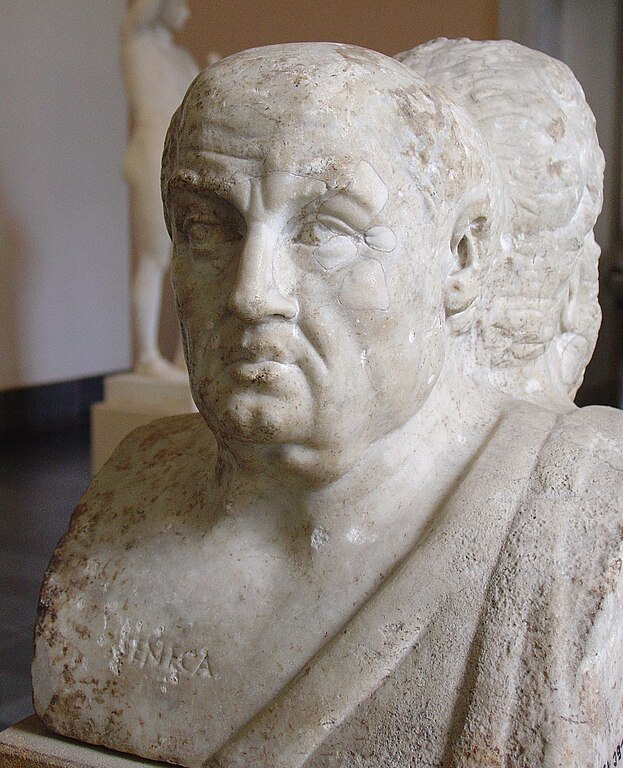 |
| Bust of Seneca (from Wikimedia) |
For instance, one central tenet of the Stoic creed is that one should not fear death; but Seneca rejects the notion that this change of attitude can be brought about by a kind of "logical hocus-pocus" (letter 82; p. 12). He thus writes:
Our founder Zeno uses the following syllogism:The message thus seems to be that it isn't enough to recognize the formal validity of this or that verbal argument — you have to internalize its message and learn to live by it.
'No evil is glorious;O my comforter! Dispeller of my terrors! After that I shall lay my head on the block with alacrity! Please talk more seriously, and don't make a dying man laugh. Upon my honour I should find it hard to tell you whether the man who imagines he has snuffed out the fear of death by this inference, or one who tries gravely to explode it, as if it really bore on the question, is the crazier. (letter 82, p. 11-12)
Death is glorious,
Therefore death is not an evil.'
"Breakfast, Lads!"
Seneca's own preferred medium for making such points is instead the short, forceful statement of fact that treats death without any special ornament or sentimentality. In another comment to the syllogism above, he thus comments:A moving address indeed! After that who'd demur to hurl himself on the levelled spear-points and die where he stood? But what gallant words Leonidas spoke: 'Get a good breakfast, lads: there'll be no dinner till the next world.' The food didn't rise in their mouths or stick in their throats or slip from their fingers: they accepted for dinner as cheerfully as for breakfast. Once more, there's the Roman officer speaking to the men sent to pierce a huge hostile force and seize a position: 'We must get there, boys,' said he, 'but we needn't get back again.' You see how unaffected and masterful virtue is: pray is there a single soul the chicaneries of you and your friends could inspire and brace? (letter 82; pp. 17-18)Apparently, death-talk should not only be staunch and "unaffected," but also positively folksy ("lads"). This is is a matter of style and ethics rather than logic:
What can you say to fire men's heart for a plunge into the thick of peril? With what pleading can you defeat this unanimity of dread, with what resources of genius the conviction of humanity that bars your way? Do I find you juggling with words and spinning miserable little syllogisms? (letter 82; p. 18)In fact he does, and he has an opinion to offer on the relevance of such arguments:
Your arguments run to point. Yes, and so does an ear of barley. It's the very fineness of some points that makes them useless and ineffective. (letter 82; p. 18)It's difficult not to read a gendered Victorian connotation into a word like "fineness," but I don't know what the Latin text said, or how it would sound to contemporary ears.
"Storm the Stronghold of the Passions"
Seneca makes a similar point when discussing the dismissive Stoic attitude towards money, and in particular, the false sense of pride and security that people may draw from their wealth. Again, he counters this notion with a syllogism in the classical form:Good doesn't result from evils. Wealth does results from a sum of many poverties: therefore wealth is not a good. (letter 87, p. 58; italics in original)But he has little hope that such arguments really convince anybody:
Are we likely to argue the pros and cons in syllogisms of the kind we've just seen? Are we likely by their means to succeed in making the Roman people seek poverty, the groundwork and source of their imperial power, and honour it, shrink in dismay from their own wealth, reflect that they discovered this wealth in the treasuries of the vanquished, that from it bribery, corruption, and political disorders have forced their way into the most irreproachable and austere of cities, that the spoils of other nations are too gloatingly paraded, and that what one people has wrestled from all, all may more easily wrest from one? No, it is our actions [that] must champion that law: we must storm the stronghold of the passions, not draw lines round them. Let us speak, if we can, more forcibly; if not that, more plainly. (letter 87; p. 59)It thus seems that in Seneca's ethical idiom, there is a strong connection between (1) being a "man of action" rather than idle words; (2) having learned to live in accordance with one's ethical truth; and (3) talking in a certain "no-nonsense" style of frank, manly prose.
In a sort of roundabout way, the effect is thus that he comes to appear in line with the modern "one true sentence" philosophy of writing that we associate with Hemingway — another decidedly macho writer/soldier/moralist.
No comments :
Post a Comment